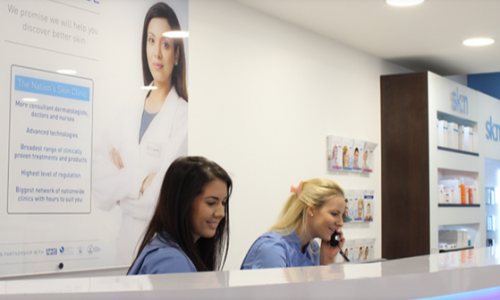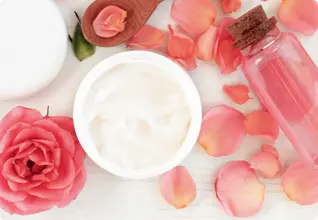Everything you need to know about moles with Natalie Fisher

This week Natalie Fisher (@the.derm.nurse), Screening Nurse at The MOLE Clinic featured on SheerLuxe with an exclusive interview sharing the brands mole screening mission to detect skin cancer as early as possible. Please enjoy the full Sheerluxe Show below. (Pssst… Nurse Natalie is on at 29.48).
Q: What is the difference between moles and freckles?
A: Moles are more permanent fixtures and go deeper in the skin whereas freckles are quite superficial. What you might notice with freckles is that they go darker in the summer months whereas moles stay quite static throughout the year.
Q: Is a mole always raised?
A: No not necessarily, moles can be flat, they can be soft and raised, firm and raised, there’s many different types of mole.
Q: Skin cancer now makes up 1/5 of cancers in the UK, but is it always a horrible sentence?
A: There are many different types of skin cancer, although we primarily focus on Melanoma. Melanoma is a skin cancer that appears within a mole that’s changing, it’s right we focus on this type of cancer as it does have the ability to spread. Actually the most common skin cancer doesn’t appear in a mole it appears as a pink spot that doesn’t heal, so it’s that non-healing that should be ringing alarm bells. However it doesn’t affect your life in any way, it doesn’t spread, and it doesn’t kill you, it just needs to be treated so it doesn’t continue to grow.
Q: What makes you more susceptible to skin cancer?
A: There are numerous different things, the first is to look at skin type. If you’re very fair, freckly, have ginger hair, blue eyes or are someone that burns easily you’re skin type one and that would put you at risk. If you have a lot of moles or unusually shaped moles that’s another risk. We also look at family history so if there’s a history of skin cancer that effects your risk. Also your past history of sun exposure, so blistering sunburns before the age of 18, if you’re someone that enjoys getting a tan or using sunbeds this also increases your risk.
Q: Obviously so many of us have made bad sunbathing mistakes when we were in our teens, does that mean even if you don’t have moles you should still get your skin checked just in case because of sun exposure?
A: At The Mole Clinic we actively encourage you to get your skin checked at least once every 6 months. It’s not something we talk about enough in the UK, we identified it’s the 5th most common cancer and it’s one of the worst effecting younger age groups as well so because we’re unable to offer a skin screening service on the NHS it means that these lovely private services are able to take that on.
Q: What are things we should be looking out for?
A: I would encourage everyone to become really familiar with their skin, know what looks normal for you, check your skin once a month when you get out the shower and make it a habit. We shouldn’t really be developing new moles after the age of 35-40, so anything new after that age should be checked.
Q: Are there certain places women should check in comparison to men?
A: In men, melanoma usually appears on their backs whereas women is appears on their calves or lower legs and we think that’s because of our behaviors, women tend to wear skirts and men sunbathe with their tops off, but that doesn’t mean don’t check other areas as well!
Q: You mentioned the chances for skin cancer in children are pretty low?
A: Yes, the risk of skin cancer in children are particularly rare. Normally if there is any concern there’s a family history and most children will be checked anyway. If you’re a parent and are extremely concerned about your children’s moles, we tend to develop all our moles in childhood and early adulthood, so chances are your children will develop moles growing up and they will grow slightly with them. My general rule is that if you’re concerned get it checked out. The most effective thing you can do as a parent is making sure you’re protecting them against UV exposure so be hot on using that sunscreen, step it up to that factor 50.
Q: If you’re not concerned about moles and don’t have anything in particular but have had a lot of sun exposure, is there anything you can do to safe guard ourselves in the future?
A: Absolutely, it’s great if you’re aware you’ve had that level of sun exposure and you program those monthly checks, but it’s never too late to get into those monthly habits – do start wearing that sunscreen. In the winter months I recommend wearing a factor 30 and step it up to a factor 50 in the summer and apply enough of it.
Click here to discover more about our skin cancer services.
Related Articles

08
Apr 2024

08
Apr 2024
Request a callback
One of our friendly sk:n advisors will call you to book your consultation.
- More than 450 consultants, doctors, nurses and medical practitioners
- Regulated by the Care Quality Commission, Health Inspectorate Wales and Health Improvement Scotland
- Partner of the NHS
- Rated excellent by our clients on Trustpilot
- Strict safety and care protocols




